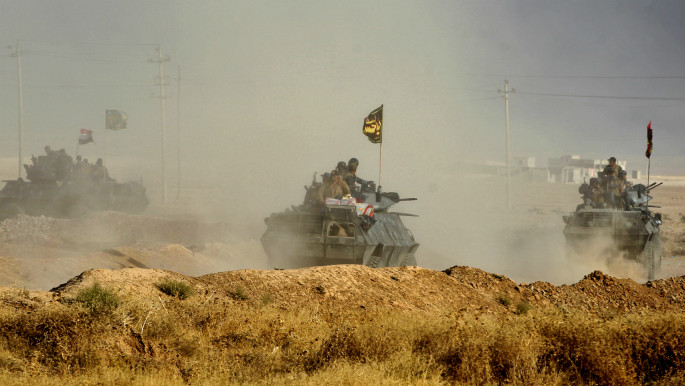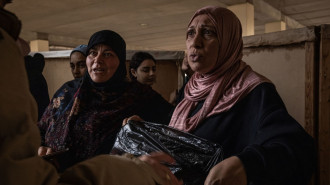Fear and loathing in Mosul: IS beheads 'spies'
The residents of the Iraqi city of Mosul have come under an intense surveillance campaign in the weeks ahead of the long-awaited assault to retake the city from the Islamic State group [IS].
Former residents of the city, who maintain covert communications with the hundreds of thousands of remaining civilians, have said that IS has executed anyone caught communicating with people outside or talking about the situation outside the IS-held city.
Iraqi government and Kurdish forces, backed by US-led coalition air and ground support, launched coordinated military operations early on Monday as the long-awaited fight to wrest the northern city of Mosul got underway.
The beginning of the assault also saw aid groups voice fears for the embattled civilians in the city, with IS expected to use them as human shields.
"IS has been executing people accused of 'spying' on a weekly basis. The last execution was on Tuesday last week; six people were beheaded, including a women," Khaled Hussein, a refugee from Mosul in contact with friends living in the city, told The New Arab correspondent Adam Mahmoud.
"The rate of the executions rose two months ago when IS intensified its monitoring of telecommunications. Some people have even been killed for speaking in public about what is going on outside Mosul," Hussein said
"Others have been killed for phoning relatives and friends, these people were not in contact with the Iraqi military," he added.
 |
IS has been executing people accused of 'spying' on a weekly basis. The last execution was on Tuesday last week; six people were beheaded, including a women |  |
Many people in Mosul have been cut off from the outside world with IS banning satellite television and internet access, which the Iraqi government has tried to address by broadcasting radio messages into the city and air dropping newspapers.
 |
|
| Iraqi government forces launched coordinated military operations early on Monday [Getty] |
Local Sheikh Mohammad al-Shammari said that Mosul residents were living in fear of the IS fighters, who swept into the city two years ago.
"IS members know that not all the locals are not on their side and the few people who have enlisted either originally belonged to the group or are sympathisers," Shammari, who fled Mosul a year ago, said.
"Executions have become the norm in Mosul as public displays of dissent have made IS' members hate locals even more. Even a telephone call between a man check on his elderly parents' health terrifies the group.
"People have been killed for the smallest violations to their rules. People are more scared of IS fighters than the ongoing battle to retake the city," Shammari added.
| See in pictures: Mosul offensive begins |
UN fears
Meanwhile, a top humanitarian official at the UN has expressed concerns for the safety of Mosul residents as Iraqi forces begin the assault on the city.
While military operations have been planned for several months, humanitarian agencies have warned they could be overwhelmed by the mass exodus of residents escaping the fighting.
"Depending on the intensity and scope of the fighting, as many as one million people may be forced to flee their homes in a worst-case scenario," Under-Secretary General for Humanitarian Affairs and Emergency Relief Coordinator Stephen O'Brien said.
 |
Depending on the intensity and scope of the fighting, as many as one million people may be forced to flee their homes in a worst-case scenario |  |
However many are at "extreme risk" of being caught in the crossfire or targeted by snipers, O'Brien said, if they attempted to reach safety.
"Tens of thousands of Iraqi girls, boys, women and men may be under siege or held as human shields," he added.
"Thousands may be forcibly expelled or trapped between the fighting lines."
He urged that civilians were protected from the fighting, adding: "Nothing is more important."
Shelter is available for 60,000 people in camps and emergency sites, while construction of additional camps to receive 250,000 more people is under way.
Food rations for 220,000 families are ready for distribution, 143,000 sets of emergency household items are in stock; latrines and showers are being readied for dispatch and 240 tonnes of medication are available at distribution points, O'Brien added.

![Palestinians mourned the victims of an Israeli strike on Deir al-Balah [Getty]](/sites/default/files/styles/image_684x385/public/2024-11/GettyImages-2182362043.jpg?h=199d8c1f&itok=xSHZFbmc)


![The law could be enforced against teachers without prior notice [Getty]](/sites/default/files/styles/image_684x385/public/2178740715.jpeg?h=a5f2f23a&itok=hnqrCS4x)
 Follow the Middle East's top stories in English at The New Arab on Google News
Follow the Middle East's top stories in English at The New Arab on Google News


